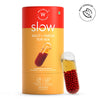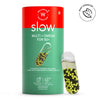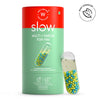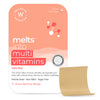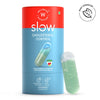High cholesterol —you may not feel any symptoms, but over time, it can take a toll on your heart health. The good thing is that you don’t need extreme diets or complicated routines to get it under control. Small, consistent changes can make a big impact, helping you bring your numbers back into balance while still enjoying your daily life.
If you're wondering how to reduce cholesterol and protect your heart, you’re in the right place. Let’s dive into simple, science-backed strategies that work.
Understanding Cholesterol
Not all cholesterol is created equal. Your body actually needs some to function properly, as it plays a key role in hormone production, digestion, and cell repair. However, when LDL (low-density lipoprotein) cholesterol—often called “bad cholesterol”—builds up in your arteries, it can create blockages, increasing the risk of heart disease and stroke. On the other hand, HDL (high-density lipoprotein) cholesterol is beneficial, as it helps remove excess cholesterol from the bloodstream.
Now that we know the difference let’s explore how to lower cholesterol with simple strategies.
Upgrade Your Diet
Your diet is a great place to start. Certain foods actively work to combat high cholesterol, while others only make things worse. Here’s what to include and what to avoid:
Foods to Add:
-
Fiber-Rich Foods: Oats, beans, lentils, and flaxseeds help bind cholesterol and remove it from the body before it can cause harm.
-
Healthy Fats: Replace saturated fats with heart-friendly options like avocados, olive oil, and fatty fish rich in omega-3s.
-
Oats and Whole Grains: Rich in soluble fiber, which helps reduce LDL (bad) cholesterol.
-
Nuts and Seeds: Almonds, walnuts, and flaxseeds contain heart-healthy fats that support good cholesterol levels.
-
Fruits and Vegetables: Apples, berries, leafy greens, and carrots are rich in fiber and antioxidants that support cardiovascular function.
-
Legumes: Lentils, chickpeas, and beans provide plant-based protein and fiber, helping manage cholesterol levels.
Foods to Avoid:
-
Trans Fats and Processed Foods: Found in fried foods, pastries, and packaged snacks, these increase LDL while lowering HDL, making them a major risk factor for heart disease.
-
Excess Sugar: Sugar spikes inflammation, which is linked to higher cholesterol levels. Stick to natural sweeteners and whole fruits instead.
-
Refined Carbs: White bread, pasta, and sugary cereals may taste good but contribute to blood sugar spikes and increased LDL levels.
Move More, Stress Less
You don’t need to train for a marathon, but regular movement is one of the most effective ways to combat high cholesterol. Exercise not only helps increase HDL but also improves circulation, reduces inflammation, and strengthens the heart.
Effective Approaches:
-
Cardiovascular Exercise: Brisk walking, swimming, or cycling for at least 30 minutes a day can significantly lower LDL levels.
-
Strength Training: Lifting weights or doing bodyweight exercises helps improve metabolism and fat balance.
-
Stress Management: Chronic stress can elevate cholesterol levels. Meditation, deep breathing, mindfulness, and natural supplementation can make a meaningful difference.
Sleep, Hydration, and Other Overlooked Factors
It’s easy to focus on food and exercise, but other lifestyle factors also play a role in cholesterol management.
Prioritize Quality Sleep:
-
Aim for seven to nine hours per night. Lack of sleep can disrupt metabolism and lead to higher LDL cholesterol.
-
Establish a calming nighttime routine—limit screen time, dim the lights, and consider herbal teas to unwind.
Stay Hydrated:
-
Drinking enough water supports circulation and helps remove excess cholesterol from the body.
-
Herbal teas with adaptogenic herbs can further support digestion and metabolism.
Smart Supplementation
Even with the best diet, getting the right balance of nutrients to support heart health isn’t always easy. Certain supplements can provide an extra layer of support when it comes to lowering cholesterol effectively.
Key Nutrients to Look For:
-
Natural Plant Sterols: These compounds naturally reduce LDL levels and are found in select high-quality supplements [NIH].
-
Omega-3 Fatty Acids: Essential for heart health, they help reduce inflammation and lower triglycerides [NIH].
-
Niacin (Vitamin B3): Supports cholesterol balance by increasing HDL levels [NIH].
While no supplement can replace a balanced diet completely, choosing the right ones can enhance your journey toward better heart health.
In a Gist
Remember, there’s no quick fix for lowering cholesterol levels, but small, consistent changes can lead to lasting results.
Practical Tips:
-
Cook more meals at home using heart-friendly ingredients.
-
Find an exercise routine you enjoy.
-
Choose quality over quantity when it comes to food and supplements.
-
Check your cholesterol levels regularly and track your progress.
Taking control of your cholesterol isn’t just about improving lab results—it’s about creating a lifestyle that supports energy, longevity, and overall well-being.
Combat high cholesterol with simple, sustainable changes that fit your life. A balanced diet, smart supplementation, regular movement, and stress management can help you feel your best—without extreme restrictions.
FAQs
1. What is high cholesterol, and why is it dangerous?
High cholesterol occurs when there’s excess LDL (bad cholesterol) in the blood, which can build up in the arteries and lead to blockages. This increases the risk of heart disease, stroke, and other cardiovascular issues. Since high cholesterol doesn’t always show symptoms, regular monitoring is essential for prevention.
2. How can diet help in lowering high cholesterol?
A heart-friendly diet can actively reduce LDL cholesterol while boosting HDL (good cholesterol). Consuming fiber-rich foods like oats, legumes, and fruits helps remove excess cholesterol, while healthy fats from nuts, seeds, and fatty fish support heart health. Avoiding processed foods and refined carbs also plays a crucial role.
3. Which foods should I avoid to combat high cholesterol?
To manage cholesterol levels, limit trans fats and processed foods found in fried snacks, pastries, and fast food. Excess sugar and refined carbohydrates like white bread and sugary cereals can also contribute to higher LDL cholesterol and inflammation, increasing heart disease risk.
4. How can exercise help lower cholesterol?
Regular physical activity helps increase HDL (good cholesterol) while reducing LDL and improving circulation. Cardio exercises like brisk walking, cycling, or swimming, along with strength training, can improve metabolism and support heart health. Managing stress through activities like yoga or meditation further enhances cholesterol balance.








